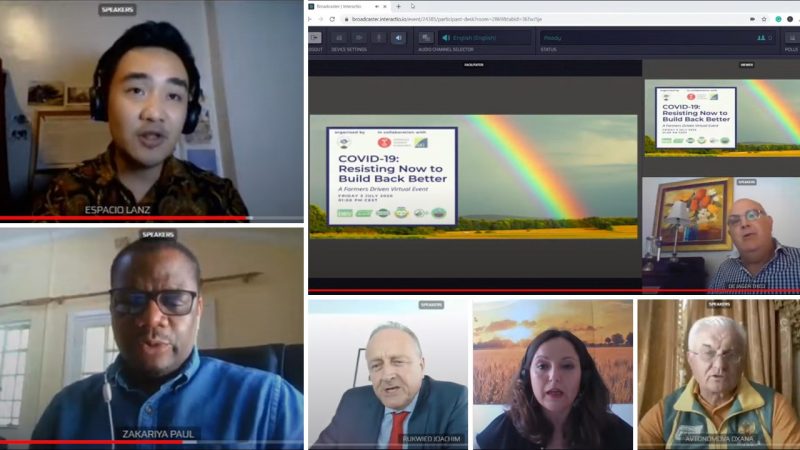Rome, Italy, July 6, 2020 – Last Friday, July 3rd, farmers’ representatives from all over the world convened digitally to share their thoughts and considerations, as well as experiences and lessons learnt during the pandemic outbreak.
COVID-19 is putting unprecedented pressure on agriculture and farmers worldwide. Still, farmers’ organisations across the globe have stood strong in the middle of this storm, ensuring that no farmer is left behind.
Organised by the World Farmers Organisation (WFO) with Andreas Hermes Akademie (AHA) and AgrarKontakte International (AKI), the webinar “COVID-19: Resisting Now to Build Back Better” provided an excellent occasion for shining a light on farmers’ adaptability and ability to innovate, organise, share and support each other at the time of coronavirus. Above all, the meeting offered a great venue to discuss the “new normal” farmers want.
The event was composed of two sessions. The first part focused on the experience of national farmers’ organisations in helping members coping up with shocks in the food systems.
Participants in the panel were: Joachim Rukwied, President, and Werner Schwarz, Vice President, of the German Farmers’ Association (DBV); Vladimir Plotnikov, President of the Russian Association of Rural and Farm Enterprises and Agricultural Cooperatives (AKKOR); Oswald TUYISENGE, Executive Secretary of Rwandan Farmers’ Union (INGABO); Paul Zakariya, Executive Director of Zimbabwe Farmers’ Union (ZFU).
Werner Schwarz introduced the “Transitional Agriculture” project and how the pandemic outbreak has impacted the first program and at the same time offered the opportunity to innovate the farmer-to-farmer exchange. The project brings together farmers’ organisations from Russia (AKKOR), Germany (DBV), Malawi (NASFAM), Zimbabwe (ZFU), Rwanda (INGABO), and Ghana (COFAG) under the umbrella of the World Farmers’ Organisation (WFO) to foster a direct exchange on agricultural issues relevant to development policy. It promotes a peer to peer network of farmers organisations with the firm belief that the most effective way of agricultural exchange is the communication among farmers.
Vladimir Plotnikov highlighted how important is the international peer-to-peer learning for AKKOR, at the times of COVID-19, as farmers learn more from other farmers than from anybody else.
Paul Zakariya shined the light on the role of the farmers’ organisations and their main mission of advocating for their members. He told the audience how, at COVID-19 times, ZFU has ensured to keep the farmers’ voice high in the political response of the Zimbabwean government, reminding what is still needed for long-term recovery.
The second panel focused on what “building back better” means for farmers’ organisations across the globe and what are the main key priorities and challenges to succeed.
Speakers joining the debate during this second session were: Alberto Broch, President of Confederación de Organizaciones de Productores Familiares del Mercosur Ampliado (COPROFAM); Elizabeth Nsimadala, President of the Pan African Farmers’ Organisation (PAFO); Lanz Espacio from Asian Farmers Association (AFA), Coordinator for the UN Decade of Family Farming and Young Farmers’ Agenda; Theo de Jager, President of the World Farmers’ Organisation (WFO).
Elizabeth Nsimadala presented to the audience “e-GRANARY” through a written statement delivered by the moderator Arianna Giuliodori, Secretary General of the World Farmers’ Organisation, the mobile platform aimed at increasing farming profitability by improving the productivity of participating farmers through input provision and technical services, as well as resolving bottlenecks and improving efficiencies of the value chain leading to access to markets and improved trade.
Alberto Broch, representing COPROFAM that is one of the strongest advocates for the UN Decade of Family Farming, focused his speech on how we can more and more effectively support family farmers in coping with existing and emerging challenges, highlighting that innovation is crucial to exploit farmers’ potential.
Stronger resilience, to cope with any kind of disasters, including this pandemic, is the key for more sustainable food systems. In this sense, Lanz Espacio promoted the role of young farmers as active agents in finding the right solution. Furthermore, he reiterated the importance of multi-stakeholder partnerships involving all the actors to overcome the economic, environmental, and social challenges of the 21st century.
During the final remarks, Theo de Jager reminded the audience that a global strategy is needed to “Build Back Better”, repairing much of what was broken and designing fairer and more sustainable food systems.
The time has come for farmers to show that they are the real anchor of the sustainable and diverse food systems we want.
See below a range of resources from this event:
Transitional Agriculture – Peer to peer exchange in times of COVID-19
